Summary: Dental filling treatments are essential for maintaining oral health and repairing damaged teeth. However, both pre-treatment and post-treatment care play a significant role in ensuring the fillings effectiveness and longevity. This article outlines four key precautions to consider before and after undergoing dental filling treatments, including understanding the procedure, managing postoperative pain, maintaining oral hygiene, and attending follow-up appointments. By adhering to these guidelines, patients can enhance their overall treatment experience and protect their dental health for the long term.
1. Understanding the Dental Filling Procedure

Before undergoing a dental filling, its essential to have a clear understanding of the procedure. Patients should ask their dentist questions about what to expect before, during, and after the treatment. This can help alleviate any anxiety or fear surrounding the process. Understanding the materials used for fillings, such as composite resins or amalgam, can also aid patients in making informed decisions regarding their dental health.
In addition to knowing the procedure, patients should be aware of the signs that indicate a filling may be necessary. Regular dental check-ups can help catch cavities early, reducing the time and discomfort associated with more extensive procedures. Awareness of ones dental health state promotes proactive management.
Lastly, discussing any pre-existing conditions or medications with the dentist is crucial. Some medical conditions might affect how a patients mouth reacts to the filling, and certain medications can also influence healing. Transparency with the dental professional assists in tailoring the treatment plan to the individual.
2. Pain Management During Recovery
Post-treatment pain is a common concern for many patients after receiving dental fillings. Understanding how to manage this discomfort is critical. Dentists often recommend over-the-counter pain relievers to help alleviate any soreness in the treated area. Patients should ensure they adhere to the recommended dosages and avoid substances that may complicate recovery.
Some patients may also experience sensitivity to hot or cold temperatures after their procedure. It is advisable to consume soft foods at room temperature for the first few days to minimize discomfort. Avoiding extreme temperatures can help prevent unnecessary pain and allow the filling to settle comfortably.
Additionally, observing any unusual or prolonged pain after the procedure is essential. If discomfort persists beyond a few days, patients should consult their dentist. Early intervention can prevent further complications and enhance the overall success of the filling treatment.
3. Maintaining Oral Hygiene Post-Treatment
Good oral hygiene practices are vital, especially after undergoing dental fillings. Maintaining a routine of brushing and flossing helps keep the filling intact and the surrounding gums healthy. However, its important to avoid vigorous brushing near the newly filled tooth for the first 24-48 hours to prevent irritation.
Patients should use a soft-bristled toothbrush and fluoride toothpaste to clean their teeth gently. Establishing a balanced diet and avoiding sugary snacks can also contribute to dental health. Regularly rinsing with an antibacterial mouthwash can help in reducing plaque buildup around the filled tooth.
Moreover, using a straw while drinking can limit exposure to sugary or acidic beverages. This practice can prevent potential damage to the filling and support the healing of any irritation caused during the procedure. Adopting these habits ensures longevity and stability for dental fillings.
4. Importance of Follow-Up Appointments
Finally, attending follow-up appointments after a dental filling is crucial for monitoring healing and ensuring that the filling is functioning correctly. Dentists can identify any issues early on and provide necessary adjustments. Skipping these appointments can lead to overlooked problems that may require more extensive treatments down the line.
Patients should ask their dentists about the recommended timeframe for follow-ups. Regular evaluations can help detect fractures or deterioration in the filling material, ensuring patients maintain optimal dental health. Having a check-up shortly after the procedure can also provide reassurance regarding the fillings effectiveness.
Furthermore, these follow-up visits serve as an excellent opportunity to discuss any new concerns that may arise, allowing for timely intervention. Maintaining communication with the dental care team can significantly improve oral health outcomes and enhance the overall patient experience.
Summary:
In summary, patients must consider several essential precautions before and after undergoing dental filling treatments. From understanding the procedure and managing post-treatment pain to maintaining oral hygiene and attending follow-ups, these practices can greatly influence the success of the treatment. By following these guidelines, individuals can ensure their dental fillings serve their purpose effectively.
This article is compiled by Vickong Dental and the content is for reference only.
Vickong Dental
Vickong Dental is a large medical group established in Hong Kong in 2008 by professors from well-known medical universities in Guangdong and Hong Kong, as well as medical doctors from key national '985' universities (including Master's supervisors and senior professors). The chain of branches brings together expert dentists with PhDs and Master's degrees from Hong Kong and Mainland China, committed to providing high-quality dental treatment.
"Vickong Dental Practices the University Motto of 'Healing and Serving Society,' with a Stable Operation for Sixteen Years. It Has Been honored with Hong Kong Enterprise Leaders's Choice,' and is a Global Trusted Implant Center for the Nobel Implant System. Recommended by Hong Kong Metro Broadcast and Guangdong Television, it Serves Customers from Over Thirty Countries and Regions, Gaining the Trust and Favor of Citizens from the Guangdong-Hong Kong-Macau Greater Bay Area and Surrounding Cities.

Thousands of customers' unanimous praise
The most recognized and highly recommended dental service by customers in the Guangdong-Hong Kong-Macau Greater Bay Area
We Ensure You Receive Detailed Care and Attention Here
Hong Kong standards, Shenzhen prices, Your Trusted English-speaking dentists

Vickong Dental Medical-Grade Instrument Disinfection Process
Vickong Dental Medical-Grade Instrument Disinfection Process

Vickong Dental Chain: A Warm and Comfortable Environment for Treatment






Appointment Hours

Q&A
Why choose Vickong Dental?
Vickong Dental practices the university motto 「Medicine to Benefit Society」, with each branch bringing together highly qualified dentists with doctoral and master’s degrees from Hong Kong and the Mainland, and has maintained seventeen years of steady operation。Recipient of 「2024 Hong Kong Enterprise Leaders Brand」, 「2025 Hong Kong Enterprise Leaders Brand」, a Nobel Biocare Global Trusted Implant Center, and a brand recommended by Metro Radio Hong Kong and Guangdong TV。
To date, we have served customers from more than thirty countries and regions,earning exceptionally high word-of-mouth recognition and trusted recommendations from residents across the Guangdong-Hong Kong-Macao Greater Bay Area and surrounding cities
We have eight major branches in Zhuhai、Shenzhen,and a consultation and service assurance center in Hong Kong,so you can book a free consultation at any time for any questions,which is very reassuring.
If I do not accept the quotation after the CT scan, will I be charged??
No! As long as the actual treatment has not started, you will not be charged any fees.
Will there be any additional charges during the treatment process?
No, there won’t be any additional charges. Before treatment begins, we will clearly explain the treatment plan and its corresponding fees. Only after the patient agrees and signs the consent form will we proceed with the dental service.
Can I pay in Hong Kong dollars?
Yes. Vickong Dental accepts payment in Hong Kong dollars. The amount will be converted based on the exchange rate of the day, and the applicable rate will be clearly communicated to you in advance.
Can I reschedule my appointment at any time?
Yes. Please contact us via **WeChat** or **WhatsApp** as early as possible, providing your original appointment time and details, along with your preferred new date and time slot for rescheduling.













